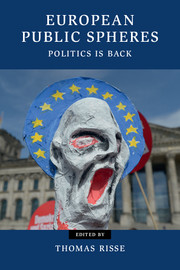Book contents
- Frontmatter
- Contents
- List of figures
- List of tables
- List of contributors
- Preface
- 1 Introduction
- Part I How to grasp the Europeanization of public spheres: theory, methods, empirics
- Part II Consequences: does the Europeanization of public spheres matter?
- 6 European public spheres, the politicization of EU affairs, and its consequences
- 7 Media and identity: the paradox of legitimacy and the making of European citizens
- 8 The restructuring of political conflict in Europe and the politicization of European integration
- Part III Theoretical and normative implications
- Bibliography
- Index
7 - Media and identity: the paradox of legitimacy and the making of European citizens
Published online by Cambridge University Press: 05 November 2014
- Frontmatter
- Contents
- List of figures
- List of tables
- List of contributors
- Preface
- 1 Introduction
- Part I How to grasp the Europeanization of public spheres: theory, methods, empirics
- Part II Consequences: does the Europeanization of public spheres matter?
- 6 European public spheres, the politicization of EU affairs, and its consequences
- 7 Media and identity: the paradox of legitimacy and the making of European citizens
- 8 The restructuring of political conflict in Europe and the politicization of European integration
- Part III Theoretical and normative implications
- Bibliography
- Index
Summary
Ever since research on European public spheres has emerged in the social science and communication literatures, it has rested on implicit links with the question of European identity. With the crisis that emerged since the beginning of the 2010s, questions on whether a European identity would be strong enough to allow the European Union (EU) to survive through unprecedentedly turbulent waters became even more topical. In turn, European public spheres have been perceived as a cause, a consequence, or a symptom of European identity. Always, however, public-sphere researchers have considered European identity as the “bigger picture” that would bring citizens back into the equation. This chapter makes this implicit link somewhat more explicit and provides a direct understanding of how citizens’ European identity is potentially affected by news on Europe, thereby reflecting on the causal links that “bring politics back in.”
Much of the research on European identity and the European public spheres seems to have been built around a duality of assumptions that is nothing short of paradoxical. First, many have assumed that European identity could emerge only under the condition that a European public sphere in which European issues are debated exists. Second, any criticism of European institutions and policies perceived as “Euroskepticism” is assumed to potentially prove that the European identity does not exist. Although neither assumption is intellectually obvious, it seems to us that they are largely incompatible and, at face value, the public-sphere condition seems more tenable than the “skepticism-less” condition. Indeed, can a political system emerge without political debate? Can a political community emerge without politicization and political dissent? In this chapter, we support the argument that although politicization is not without risk (see, e.g., Hooghe and Marks 2006), it may not be only a necessary cause but also a necessary consequence of the emergence of a European identity. In other words, we suggest that the more European people feel, the more that they appropriate debates on Europe, the more polarized they can become about them, and the more politicized is their perception of “their” – thereby appropriated – system. This contrasts with an older perception – still rife in much of the mass media – that citizens would be either pro-European and like everything European as a result, or Euroskeptic and hate everything European as a matter of principle.
- Type
- Chapter
- Information
- European Public SpheresPolitics Is Back, pp. 165 - 189Publisher: Cambridge University PressPrint publication year: 2014
- 1
- Cited by



